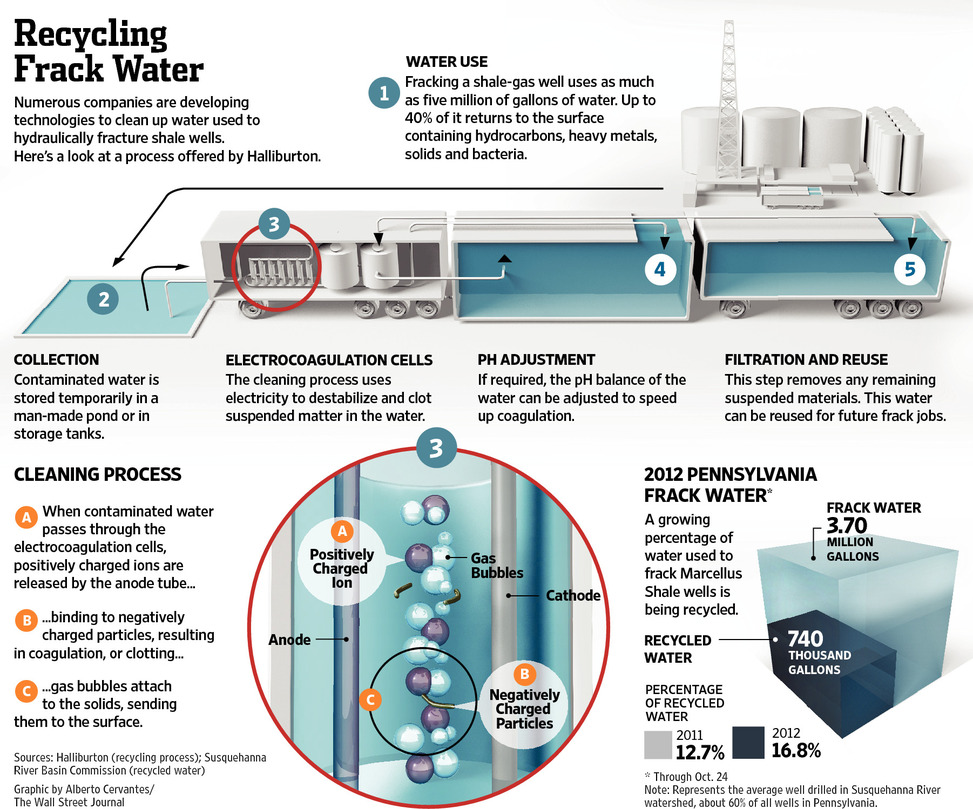Fracking confronts the reality of limited water resources
 Thursday, November 29, 2012 at 12:01AM
Thursday, November 29, 2012 at 12:01AM 
WSJ piece noting that all this hydralic fracturing (fracking) is coming up against local water limits. Already, US fracking uses water on par with the city of Chicago or Houston.
So the industry jumps into figuring out how to reuse the water multiple times by cleaning it up (not enough for drinking but enough to reuse). Already in PA the percentage use of recycled water is up to 17% this year, jumping from 13% last year.
This is a huge issue, because we're looking at 1 million more fracking wells globally by 2035, according to Schlumberger (oilfield services co.). The issue is expressed both in unwanted externalities (enviro risks/damage) and cost within the industry (acquiring and disposing).
Something to keep an eye on, as the industry competes with Mother Nature (climate change), agriculture and urbanization globally.
 US,
US,  energy,
energy,  environment,
environment,  extractive industries,
extractive industries,  water |
water |  Email Article |
Email Article |  Permalink |
Permalink |  Print Article
Print Article 









Reader Comments (5)
Exactly. The hyrdocarbon-based sector of the energy industry prefers hype over such concerns - and even environmentalists and activists seem to focus on pollution and other health risks (which " " " are debatable" " " ), but there is an undeniable impact on water supply.
With the 2012 drought in mind, and the stress that more severe weather (damaging storms in addition to droughts) is near-certain to bring, it's an unfortunate, and likely very costly trend that water continues to be neglected as a vital resource.
Problem's bigger than that--What about areas where accidents or bad practices have contaminated water supplies? Putting aside the political implications, the gas companies involved will likely be- ahem- ENCOURAGED to recycle that water as well, both to recover the gas and chemical contaminants for their own use and to free up water for the communities formerly dependent on the affected aquifers.
This reminds me of the old cartoon where the guy is sitting on a tree limb with a saw. We have tried to ruin the air we breathe, now we are going to see if we can taint the water. Out here in San Diego, some folks want to start desalination plants. That's so we can start using the ocean to take showers and wash our cars. It is absolute madness.
Micheal; here in Pa some of the companies are using coal mine acid drainage for fracking fluids....hows that for using bad water for good? Also, several companies like GasFrac are perfecting fracking methods using no water. GasFrac has done over 1000 wells using no water, I think.
Also, there are now portable systems to clean the flowback water to the point of re-use so that the work can now be done onsite, eliminating the need to truck or pipe the flowback to a recycling center.
And the chemicals used are much safer now. Halliburton now has a mixture that all constituents have been approved for use by the food and/or cosmetics industries. So thanks to the environmentalists for helping make the methods safer!
Gasfrac, which uses liquid propane extracted from the gas output of one well to fracture the rock of the next well, sounds about as unsmart as using natural gas and steam to make hydrogen for fuel cells. One of these days someone will figure out how to use carbon dioxide, which is liquid at downhole pressures, as a fracking fluid. Then you can build the electric generating plant near the gas field, and have an intrinsically waste-recycling process similar to nuclear breeder reactors, but without the radioactive waste problem, to tide you over until the economies of scale for photovoltaic power makes it cheaper than anything else and you can use the hydrocarbons for plastics and other chemical products instead of burning them for power.